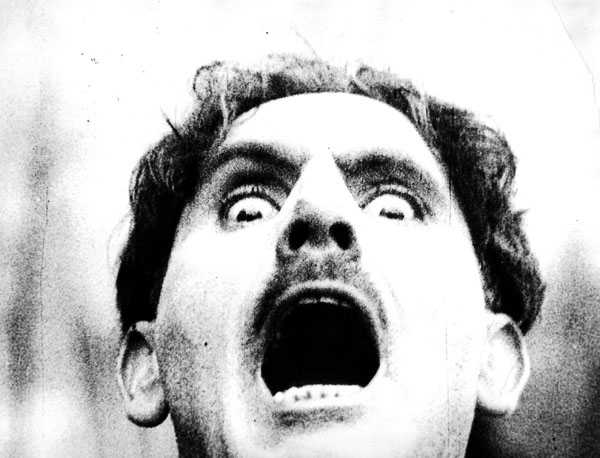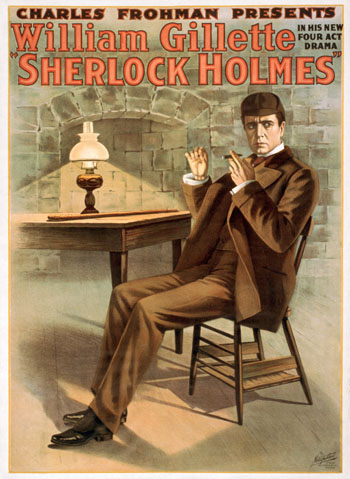“Over the span of two decades, the San Francisco Silent Film Festival (SFSFF) has transformed itself from a one-day, three-film event into the second most prestigious silent movie showcase in the world,” writes Michael Hawley at the top of his extensive overview. “As you would expect, all the stops are being pulled for the 20th anniversary edition…. The staggering 21-program line-up includes a quartet of canon-worthy classics nestled alongside several highly anticipated restorations. There’ll also be Pauline Kael‘s all-time favorite film (the 1926 French short Ménilmontant), Harold Lloyd‘s last silent picture (Speedy) and Frank Capra‘s first sound film (The Donovan Affair, whose lost soundtrack will be recreated by live actors). The roster of high-profile guests includes Kevin Brownlow, Serge Bromberg and Leonard Maltin.”
“Definitely make time to watch Andre Antoine’s 1920 French drama The Swallow and the Titmouse,” advises Peter Wong at BeyondChron. “This film was considered lost for 62 years before a negative of six hours of perfectly preserved rushes was found in the Cinematheque Francaise’s deposits. Under film editor Henri Colpi’s direction, these half-a-dozen hours of raw footage got trimmed into a brisk 79-minute tale.”
“Marking the 100th anniversary of the United States’ entry into World War I, the festival opens with Lewis Milestone‘s adaptation of Erich Maria Remarque’s novel All Quiet on the Western Front (1930),” writes Justin DeFreitas in SF Weekly. “It’s a powerful anti-war film that follows young German soldiers through the trenches and travails of the Great War. Originally made as a talkie, the studio cut an alternate silent version to facilitate its exhibition in non-English-speaking countries. Silent films were on the brink of obsolescence at that point, yet it’s the silent version that endures; without spoken dialogue there is nothing to detract from Milestone’s most stirring images, especially the film’s closing scenes.”
For more on the restoration of All Quiet, see Mike Mashon, Head of the Moving Image Section at the Library of Congress.
“By the time Sherlock Holmes (1916) was made, its star William Gillette was long established as the world’s foremost stage interpreter of Arthur Conan Doyle‘s famous character,” writes Thomas Gladysz at the Huffington Post. “Gillette visually defined Holmes’s methods, manner, and look, especially his signature attire, and his performances were widely praised, even by Doyle himself. This film, long thought lost, was recently found and restored and here makes its North American debut.”
And at Eat Drink Films, Gladysz talks with film preservationist and SFSFF Board President Rob Byrne about the discovery and adds: “Though little known today, the American actor and playwright William Gillette (1853–1937) was a superstar in his time.” The first version of his play based on Doyle’s detective was lost in a hotel fire, but by 1899, he’d rewritten it and presented it to Doyle, who called it “‘a fine play.’ Sherlock Holmes opened in New York City, where it was well received and ran for 236 performances. Gillette then took his play on the road before bringing it to London, England where it ran another 216 performances. (Charlie Chaplin, in what is considered his first legitimate stage role, played a page boy during the London run of Sherlock Holmes.)”
Also at Eat Drink Films, Victoria Haggblom talks with composer and pianist Matti Bye, who returns to the SFSFF with his ensemble for the sixth time. For more on this year’s musical performers, see Janos Gereben at the San Francisco Classical Voice.
“One of the virtues of the San Francisco Silent Film Festival,” writes Duncan Gray in the Notebook, “is how it mixes classics and arcana on a level plane. So while this year’s festival is a chance to see Garbo in her prime, and while I doubt that anything else this weekend at the Castro Theatre (or anywhere) could be more transcendent than F.W. Murnau‘s The Last Laugh (1924) with a live orchestra, the lineup is, as always, a treasure trove of rarities. And it speaks to the robust film culture here in the Bay Area that even rarities play to a crowded and responsive house.” He then takes a closer look at Dan Duyu’s The Cave of the Spider Women (1927) and Géza von Bolváry’s The Ghost Train (1927).
From the National Film Preservation Foundation: “On Friday the NFPF joins the Pacific Film Archive in co-presenting ‘Amazing Tales from the Archives,’ a symposium from the front-line of film preservation. Among the participants will be Bryony Dixon, the British Film Institute’s Senior Curator of Silent Film, who’ll present footage concerning the RMS Lusitania, sunk 100 years ago during the First World War. Also in the program, Movette Film Transfer’s Jennifer Miko will present a Technicolor tour of Hearst’s Castle, led by Hearst himself. This 10am program is free and open to the public.”
The festival opens today and runs through Monday.
Updates, 5/29: At Eat Drink Films, Richard von Busack spotlights more festival highlights and Karl Cohen writes: “Charley Bowers’s mature comedies, made in the last years of the silent era (1926–1928) are brilliant surreal works that feature outrageous Rube Goldberg-like magical inventions.”
Update, 6/6: “Normally I sit down on Thursday night and for all intents and purposes do not leave the venerable 1922-vintage Castro Theatre until the curtain comes down on Sunday night,” writes Meredith Brody in her dispatch to Thompson on Hollywood. “The festival, with the extra day, brought masterpiece after masterpiece, re-viewings as well as films new to me, in every case accompanied with witty and apposite live music.”
Updates, 6/13: For David Mermelstein, writing for the Wall Street Journal, “the most important screening from a historical perspective had to be the motley footage of a never-completed film from 1913 called Lime Kiln Field Day, shown Monday. Shot by a largely white crew but with an overwhelmingly black cast that starred the storied vaudevillian Bert Williams, the material stands as a monument to multiracial harmony in the American film industry—albeit, sadly, as the exception that proves the rule.”
Listening (79’34”). Peter Labuza and Victor Morton discuss this year’s edition in the latest episode of The Cinephiliacs.
Update, 6/18: Michael T. O’Toole looks back on a good handful of highlights for Film International.
For news and tips throughout the day every day, follow @KeyframeDaily. Get Keyframe Daily in your inbox by signing in at fandor.com/daily.





